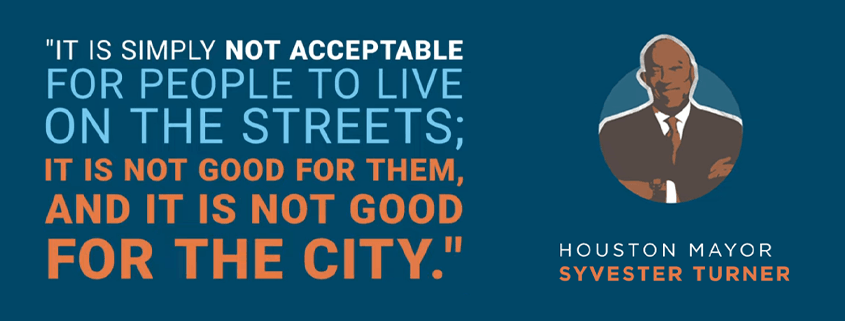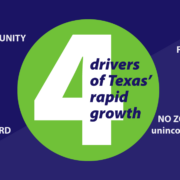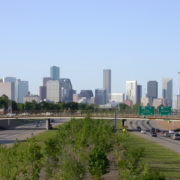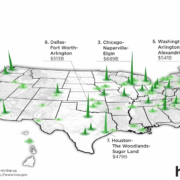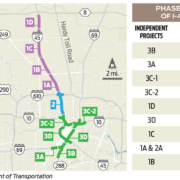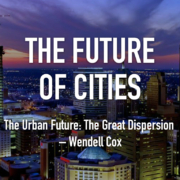Austin vs. Houston; Houston’s Tough Love Homelessness Model
A few small items to kick it off this week followed by extensive excerpts from Evan Mintz’s excellent Texas Monthly piece on Austin vs. Houston.
- Are Private Equity Firms to Blame For Rising Home Prices? – Wall Street is an easy scapegoat. The real villain lives much closer to home. Spoiler alert: NIMBYs. Hat tip to Judah.
- NYC passes LA for worst traffic as people drive instead of riding trains during the pandemic. Houston still a pretty bad #3. We just keep growing, have been less locked down than California, and so many of our jobs require being in-person (industrial, mfg, port, health care).
- At the most recent TXDoT commission meeting, they decided to receive public comment on the removal of funding for NHHIP 45N project. Decision end of August. From the tone of Chairman Bugg and Houston Commissioner Ryan, it sounds like they are ready to defund. Might be a good time to mention my ideas for reimagining the project for 80% of the benefits at 20% of the cost and disruption?…
- How the MFAH engineered the new tunnel between their buildings.
- Prager University holds up Houston Mayor Sylvester Turner’s “tough love” approach to homelessness as a model for the rest of the country.
Finally, some of my favorite excerpts from Evan Mintz’s newest Texas Monthly essay (highlights mine):
Dear Austinites, You Have Permission to Move to an Affordable, Weird City: Houston
If you’re trying to buy a home, then you’re probably a grown-up. You deserve a grown-up city—the city of Houston.
“Austin is a fun place, no doubt. Texans from across the state love to hop in the car and spend a long weekend paddle-boarding on Lady Bird Lake, swimming at Barton Springs, partying on Sixth Street, and reliving college memories at Kerbey Lane—as if the city were their personal playground. But playgrounds are for children. If you’re trying to buy a home, then you’re probably a grown-up. You deserve a grown-up city—the city of Houston.
Don’t get me wrong; Austin has some great attributes. The Capitol is a beautiful and historic building. Houston should aspire to have a campus of the caliber of the University of Texas. And Austin summers are somewhat more of a dry heat. But those great Austin amenities that people swear they could never do without—the live music! The outdoors! The progressive attitude!—exist in every other major city in one form or another. And I would argue that Houston’s offerings are better, and more sophisticated, than Austin’s.
…the fact that the city’s leadership can’t find a way to make housing affordable should be an indictment of anything related to self-proclaimed progressiveness. Politics is about power, and if Austin politicians can’t use their power to improve the fundamental living conditions of not only the most vulnerable but also a reasonably privileged middle class, then they should just admit the city is becoming a resort town for celebrities and a techno-oligarchy and spend their time arguing about plastic straws. Say what you will about Houston’s relationship with the oil and gas industry; at least pollution here has abated. Austin still hasn’t figured out how to mitigate the collateral consequences of tech wealth and Hollywood tourism.
…No doubt Houston isn’t as affordable as it used to be, especially for renters already struggling. But somehow it remains tenable for those upwardly mobile geriatric millennials taking their first steps into homeownership. In the past few months alone, I’ve seen four friends buy their first places: a new townhouse in Oak Forest, a classic eighties townhouse in Montrose, a bungalow north of downtown, and a cottage in the Second Ward. These homes aren’t in far-flung suburbs; they’re in Houston’s inner core, within walking and biking distance to the breweries, restaurants, arts venues, and other hallmarks of a livable, enjoyable city. Some of these are dense housing allowed by Houston’s lax land-use rules. Others are older homes still left standing—and reasonably priced—as new construction soaks up capital like a sponge, saving older neighborhoods from the deluge of wealth that has made Austin so unaffordable. I also know people who moved to the Woodlands.
…In contrast, Houston, a place without pretension or zoning, will gleefully tear down its past if that makes the present more appealing—anything to give you the freedom to grow. You won’t be restrained by outdated notions of what the city should be. You’ll be empowered by hopes of what the city can be. We’re improving our parks, adding more bike lanes, and expanding the mass transit system. And we don’t listen to NIMBYs who want to block affordable housing. Forty years of the Houston Area Survey show that we’re a city perpetually, even irrationally, optimistic about our future. Houston thinks there are better days ahead, while Austin worries it is past its prime.
The choice is clear: You can rage against the dying of the light in Austin and spend 50 percent of your income on housing, or you can be reborn a sweaty, home-owning phoenix in Houston.”
This piece first appeared on Houston Strategies.
Tory Gattis is a Founding Senior Fellow with the Center for Opportunity Urbanism and co-authored the original study with noted urbanist Joel Kotkin and others, creating a city philosophy around upward social mobility for all citizens as an alternative to the popular smart growth, new urbanism, and creative class movements. He is also an editor of the Houston Strategies blog.

